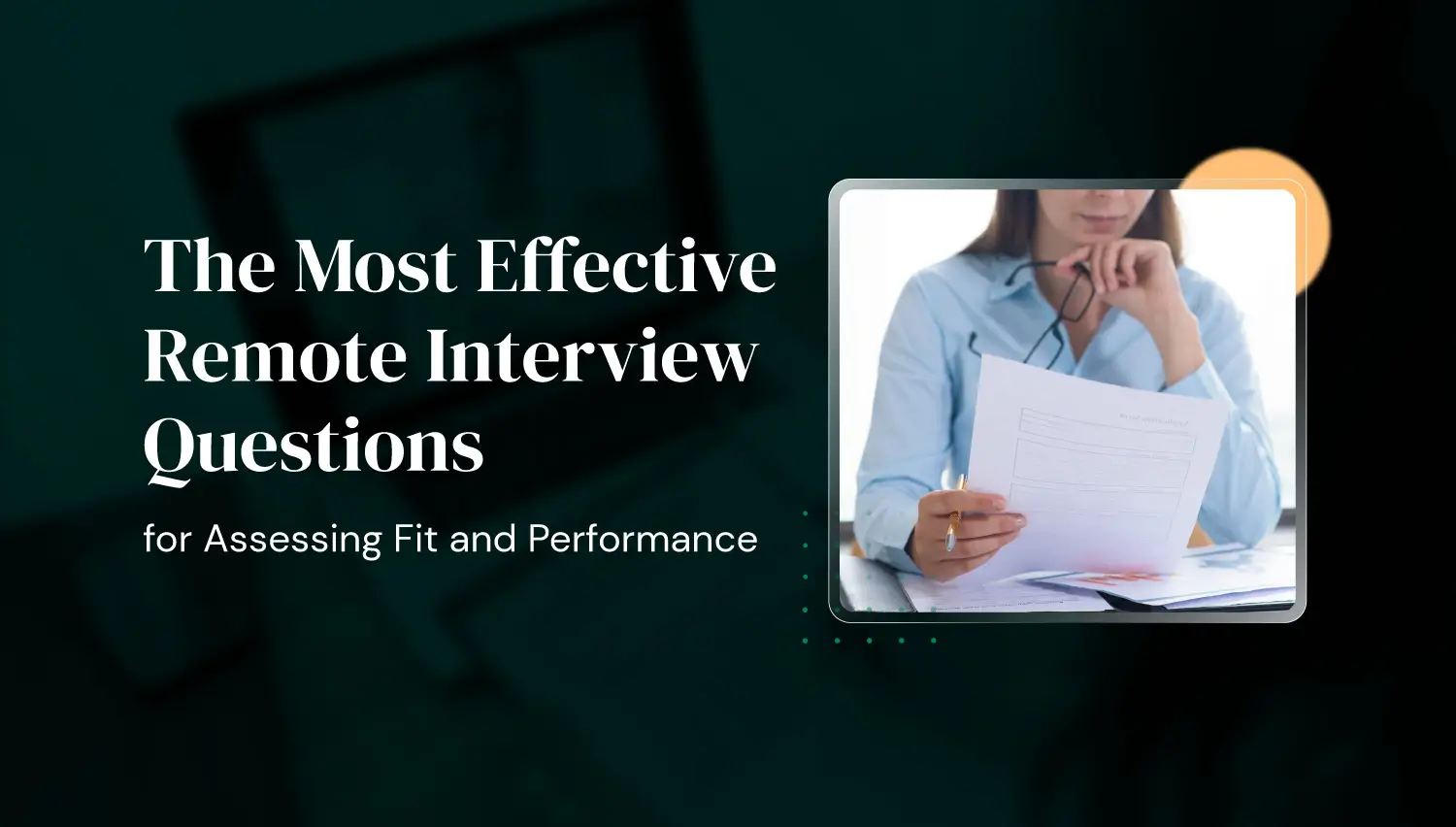If you're looking to hire virtual assistants, who are often in high demand among business owners ready to break free from the pitfalls of time-draining admin work, knowing the right virtual assistant interview questions to ask is half the battle.
Luckily, you don't need to be an HR expert to ace this aspect of your talent sourcing process.
At Somewhere, we'll help you get it right from the get-go by honing in on the most essential virtual assistant interview questions to ask your candidates, allowing you to reap all the benefits of hiring a VA.
The Most Important Questions to Ask a Virtual Assistant
.jpeg)
1. “What would you like me to know about you?”
The elevator pitch is an underrated skill. It requires creativity, presence, and a good understanding of the self and the job to put it all together.
You've read the candidate's resume, so you don't need them to repeat it back to you. Instead, ask them to tell you what they'd like you to know.
Their answers will give you a glimpse into what they value and naturally open opportunities for you to clarify things about your candidate's background and experience. It also gives you a chance to see if they can communicate effectively before you get too deep into the interview process.
The next time you open your interviews, give your candidates the stage and let them surprise you.
2. “What's a day in your life like?”
Your candidate will likely focus on all the shinier parts of their professional persona. But, asking about what they do outside of work can give even more clues into who they are. It can also help them relax and show a bit more of their personality before you get to the more difficult interview questions.
Do they begin the day with a book? Take care of kids? Do they work mornings because they attend school at night? These small hints can reveal values, character, and attitudes, more than any test can.
3. “How did you find out about the role and what do you know about it?”

You know you've got a good VA candidate if they've done their research about your company. Even better: being able to describe it to you in their own words.
This question will help you gauge how serious they are about the job while giving you a natural jumping-off point to clarify the role and the company if needed.
In a Forbes article called "Jobseekers Are Calling All The Shots. Here’s What They Want," purpose is revealed to be one of the top things candidates are looking for. By explaining how the role fits into the goals of the organization, you'll give your candidate a better understanding of the part they play.
4. “What’s your expertise?”
Virtual assistants are not one size fits all. They each come with individual skill sets. Most fall into one of two categories: generalists able to handle multiple tasks and specialists that are experts at fulfilling one important task.
Whichever you're interviewing, you need to be able to flag your candidates and confirm where their expertise lies and if their past experiences have prepared them for the roles that you're seeking to fill.
For example, if you're looking for a VA who specializes in data entry, they should be pitching themselves to you as such. At this point, you'll already know if you have someone with potential in the room.
Up to you if you'd like to keep going or cut it short; just make sure you let them know why. It'll save both your time and theirs.
5. “What is your availability?”
While your virtual assistants play a vital role in maintaining your business, remote employees may require a bit more planning to work with. Whether you're fine with an asynchronous setup or need a collaborator in the same time zone, it's ideal to have everyone on the same page.
If you need to be working synchronously, ask your candidates if they're willing to adjust (and to what extent). You'll avoid running into problems in the future by clarifying things at the start.
6. “What tools do you use to get the job done?”
Experienced virtual assistants are familiar with the tools of the trade — more than that, they're continually learning, training, and keeping up with the fast pace of tech.
You don't need to be familiar with a bunch of tools, but they do. Ideally, you're looking for candidates who have at the very least a working knowledge of a VAs toolkit, such as being comfortable using project management tools, communication apps for remote teams, or the capacity to self-teach quickly.
You will also want to check and make sure they are familiar with your business's preferred communication method.
Unfortunately, not all of the virtual assistant candidates you will interview will have perfect and complete knowledge of the tools your company uses. Having the ability to provide some training for your recruits will allow you to hire some candidates you may originally consider passing up as well as make the on-boarding process smoother.
7. “Can you list 1-3 people you’ve worked with and tell me how they will rate you from 1-10?”
.jpeg)
If your candidate has a good track record, they'll be happy to tell you all about it. This question is your opportunity to understand how your VAs perform with a team, a manager, and even with difficult team members. The question works even if you're interviewing someone who's applying for their first virtual assistant job.
You're looking for at least a rating of 8 and above. 6 and below may shed some doubt on the quality of their work, while ratings of 7 may reveal a so-so performance.
Whichever number they give, feel free to probe into their reasoning.
8. “What are you good at professionally? List at least 5.”
Because most virtual assistants are multi-faceted — with unexpected skills that may benefit your organization — asking this question gives you an overview of your candidates' skill set, from their perspective.
Expect to hear tools they're familiar with, soft skills like organizational skills, and technical skills too. If there's an answer you're looking for but not hearing, this is the perfect time to clarify.
One more thing: make sure they list at least five! Giving a minimum lets them stretch their imagination and really expound upon their professional development, especially for self-professed specialists who may have more to offer than initially thought.
9. “What are you bad at professionally or not willing to do? List at least five.”
Same as the previous question, you want to give space for your candidate to give you an honest overview of skills they don't have or aren't willing to learn. These two distinctions are important to make: you can train promising VAs for a particular task, but no amount of training will make a task easy if they aren't interested in doing it in the first place.
Let's say you're shortlisting a virtual assistant to facilitate webinars. Are they familiar with Zoom? Do they have the communication skill needed to host a webinar successfully? Are their time management skills up to par (which you can find out by asking the right time management interview questions)? If they are missing any of these important skills and are not interesting in learning them, you might need to move on to the next candidate.
Knowing these details will save you tons of time (and headaches) later.
10. “What was the biggest challenge you solved as a VA and how did you solve it?”
One of the biggest things any business owner should be looking for in a virtual assistant is flexibility and persistence. Someone who has solved a big challenge and can reverse-engineer it.
Here, asking them to walk you through a difficult situation in their professional life can help you gauge their problem solving abilities and how they handle pressure.
11. “What questions do you have for me?”
And, if they don't have any — mark that as a red flag! Great virtual assistants are curious about your organization and eager to understand your goals better. They're probably already imagining what they need to do to improve the business.
Best practices for successfully interviewing virtual assistant candidates
.jpeg)
Since you'll probably be doing a bunch of interviews, why not make the experience fun, interesting, and insightful for everyone? Remember: interviews are a two-way street. While you're learning more about your candidates, they're also learning more about you and forming their opinions on your company.
Here are three tips to make every interview count.
Tip 1: Spend your time wisely
Your time is important! Creating an interview process will benefit both you and the candidate. Avik Das, for example, in the Hiring for Tech newsletter, breaks down a 60-minute interview like this:
- 10 minutes (logistics)
- 40 minutes (problem-solving) —
- — and 10 minutes (wrap up).
How much time you'll spend in the initial interview is ultimately up to you, but it's a good idea to stick to whatever you set. Whether it's a 15-minute call, 45-minute, or 1 hour - try not to go over the clock or under on a whim.
Tip 2: Make sure your interview questions support the JD
No one virtual assistant looks the same, so it's a good idea to crosscheck your candidates' interview answers with the role you've described in the job description. If their main focus is going to be completing administrative tasks, then they should have a firm grasp of how to do so. Or, if the job description specifically mentions the candidate must be detail oriented, ensure you're asking questions about how they manage tasks on a day to day basis.
At the end of the day, no matter their individual skill set, you want to hire someone with problem solving skills. So, make sure you're screening candidates properly.
Tip 3: Before you forget–write your feedback down!

Congratulations. You're done with the interview! But, just because it's over doesn't mean your work is done. While it's tempting to dive right back into the thick of things, the post-interview phase is perhaps one of the most vital parts of hiring virtual assistants.
Why? Imagine having a pool of shortlisted candidates who all seem right for the job. But you don't 100% trust your memory. How will you be able to distinguish them?
If you're doing interviews with a teammate, it's a good idea to have a quick 5-10 minute debrief to make sure everyone's on the same page. If you're doing it alone, a sheet where you can tally up numerical grades for each question can do you wonders.
When it's finally time to choose, it's the small details that can spell the difference.
Conclusion
Finding the best virtual assistant for your business can feel challenging at times, but with the right preparation and the right support backing you up, you'll be surprised by how fun and rewarding the process can be.
If you're looking for results, then look no further. Let us know what your ideal hires are like and start interviewing awesome virtual assistants today.
FAQs about interviewing virtual assistants












.webp)
.avif)
